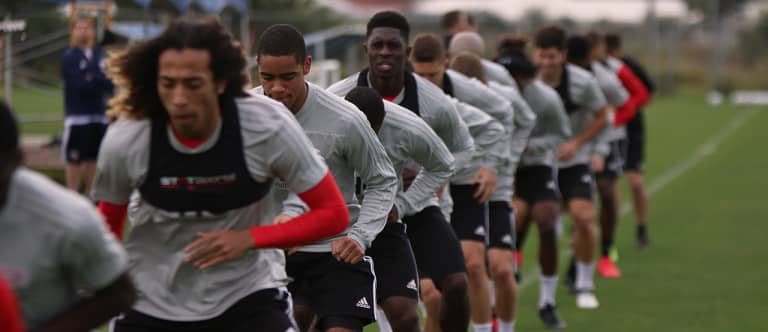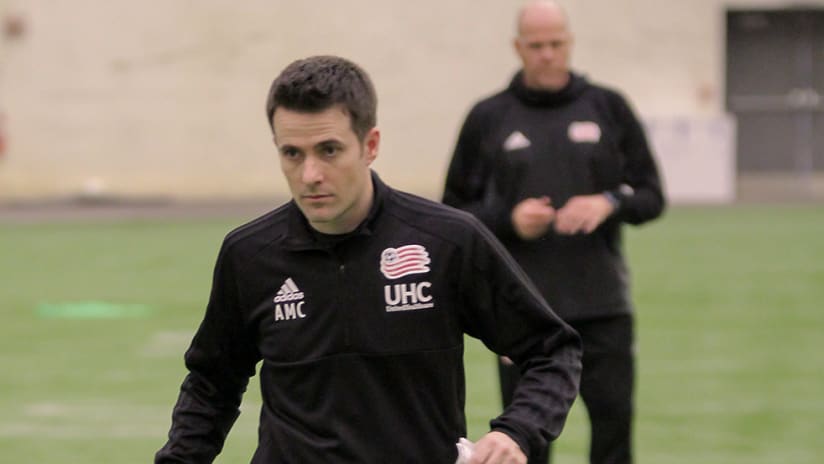VANCOUVER, B.C. — First-year head coach Brad Friedel knew he had work to do when he took over the New England Revolution, a team who had not reached the playoffs over the previous two seasons. Implementing his style and vision required a lot of work and a key component of that was the way his team would train and how they would fuel their bodies.
When asked what he changed in these areas, Friedel was blunt.
“We’ve changed everything.”
Of course, the former English Premier League and US men’s national team goalkeeper didn’t go about this by himself.
“Anton McElhone understands how I and the staff want the game played,” Friedel told MLSsoccer.com as the Revs traveled to Vancouver a couple of weeks ago. “He understands the science behind the nutrition, the recovery and the workloads. He brings us what we can do on a daily basis [in terms of] workload, we put the technical sessions together.
“Anton will know how to implement the actual diets [and] he speaks to the people making the food, he speaks to the medical staff. He does all the science behind it. He knows what the physical requirements [are] that are needed to play in the system that we want to play.”
Helping players make smart choices
McElhone joined Friedel’s staff as the head of fitness shortly after Friedel was hired. McElhone spent the previous 10 years on the Tottenham Hotspur technical staff, including the last six as the club’s first team fitness and reconditioning coach.
The Scot overhauled the first team’s nutrition inside the club’s facility, clearing out a lot of carbs and sugars that were available to the players.
“We treat them as adults. We provide them with options. So we don’t tell them ‘you must eat that,’ but what we do is we guide them by putting out good food,” McElhone said. “So [at] breakfast there’s different options. Taking away pure cereal options, fatty content, stuff that’s going to make them…fat.”
He also began monitoring every player’s weight daily, their hydration levels three times per week, and their body fat composition -- proportion of fat and fat-free mass in your body -- once every three weeks.
During McElhone's time with Spurs, the players were required to hit a target in terms of their body fat composition. The number, 10 percent, was reached by 90-95 percent of the first team by the time he left for New England. When he arrived at Foxborough, he saw something very different.
“When we started we probably had five players out of the 25 that were under 10 percent. Now [it is] probably about 75 percent of the squad under [10 percent].”
Two players who have undergone the biggest transformations are veteran defender Andrew Farrell and third-year striker Femi Hollinger-Janzen. Farrell has lost around 20 pounds according to McElhone, helping him to have a bounceback season after seeing his option declined following last year, while Hollinger-Janzen has lost 30.
“For an elite athlete, 15 percent [body fat composition] is a lot of weight [to be] carrying. You can be heavy but the thing is you want lean muscle mass. The fitter you are, the more you’re going to be able to get around the pitch.”
To improve, improve practice
Getting to the levels required by Friedel and staff isn’t only about nutrition. The way that the team trains has changed under the new head man.
The former goalkeeper has his team training more, including training twice a day a few days a month, and with more intensity than they have in the past according to one player.

Friedel and McElhone have increased the intensity at training | New England Revolution
“Obviously anyone you talk to [with the Revs] will vouch for more intensity in trainings. A lot more fitness, just raising our fitness levels,” forward Teal Bunbury told MLSsoccer.com earlier this week over the phone. “I think that starts with how we train. For instance, before we go out to training we have a 15-20 period of what we call preactivation.
"It kind of just gets your muscles firing and kind of gets your heart rate up. It's a little bit of like foam rolling and stretching and then some quick footwork. But once you get into training, it’s very regimented and it's one drill, into the next drill, into the next drill. So there's not really a lot of downtime, which is good. As players you kind of like that…I think that keeps everyone, not on edge, but alert and aware.”
Bunbury’s eight goals are the most he has had since 2011, when he was with Sporting Kansas City, and he isn’t the only one who has seen the benefits of the changes that were made.
New England currently sit in fifth place in the Eastern Conference, in good position to return to the playoffs for the first time since 2015. While their ultimate fate will be decided over the next 20 matches, the process by which they have reached this point is unlikely to change.













